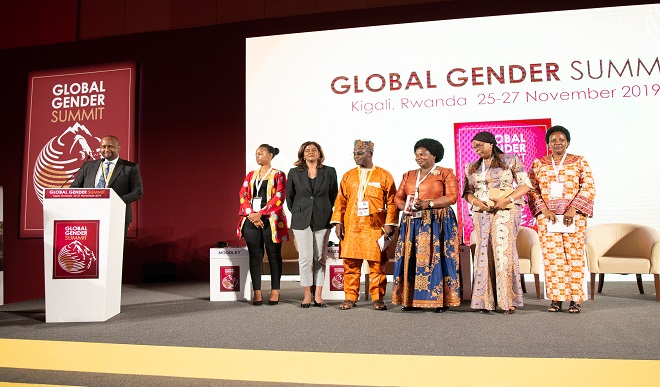The Economic Community for West African States (ECOWAS), the Common Market for Eastern and Southern Africa (COMESA) and the East African Community (EAC) have launched the ‘50 Million African Women Speak’ platform.
The platform, specifically designed to address information needs of African women in business and connect them via a custom-built social networking tool, was launched on Tuesday, during the Global Gender Summit in Kigali, Rwanda.
Representatives of the organisations, during a press conference, explained that, the platform primarily seeks to help, economically empower women by providing a one-stop shop for a variety of financial and non-financial services, they need to start and grow successful businesses.
Via the web-based platform or through the 50 Million African Women Speak mobile app, the project funded by the African Development Bank (AfDB), will collapse distances and enable women across Africa cross-pollinate, mentor and learn from one another.
Implemented by COMESA, EAC and ECOWAS, it will allow women in 38 countries find information on running businesses, accessing financial services, create business opportunities online and access training resources, ultimately contributing to their economic empowerment. Thus, contributing to the African Union’s Agenda 2063 for women and youth empowerment.
According to Hon. Christophe Bazivamo, EAC Deputy Secretary General in charge of Productive and Social Sectors, “Sixty five percent of the traded commodities in the East Africa region come from agriculture—a sector that employs 80% of women. This platform will help this big part of our population to expand markets and get new opportunities.”
ECOWAS Commissioner in charge of Social Affairs and Gender, Dr. Siga Fatima Jagne, said, the platform perfectly fits within the organisation’s scope of its programme on gender, strengthened in 2005 by the Authority of Heads of State and Government through the adoption of the Gender Policy Document.
Chileshe Kapwepwe, COMESA Secretary General, according to a release, believes that, “the creation of this platform is a very practical way of speaking to the general agenda of empowering women. I think a lot has been said and now we have come to a stage where we have practical initiatives such as this one.”

The platform comes at a time when Sub-Saharan Africa hosts close to 13 million formal and informal small and medium-sized enterprises with one or more women owners. Yet, only 16-20% of women entrepreneurs are able to access long-term financing from formal financial institutions to scale up their businesses.
In addition, with a financing gap for women entrepreneurs across business value chains in Sub-Saharan Africa estimated at $42 billion by the AfDB, the platform is a unique solution to provide information on available financial products specifically designed with women entrepreneurs in mind.
On what Nigeria is doing to ensure that women at the grassroots level benefit sufficiently from the platform, Idris Mohammed, Director of Economic Services, Ministry of Women Affairs and Social Development said, there are structures at the state levels via sister ministries where information is gathered for the platform. These are then cascaded down to the grassroots to involve the women. Admitting that it is a daunting task, he however said it was still work in progress.
He added that while researching for the project, “In Nigeria the goal was to identify relevant stakeholders who would be able to add value to whatever information had been gathered for the platform. They included Small and Medium Enterprises Development Agency of Nigeria (SMEDAN) National Council for Women Societies and the National Bureau of Statistics among others. The monitoring and evaluation strategies were also built in for sustainability of the project.
Vanessa Moungar, AfDB’s Director for Gender, Women & CSO, informed that the bank had invested $12.4 billion in the project and that the bank was investing in capacity building, as much as it could, through intermediaries working across the countries on the continent.
She said, “There are a number of programs for girls in technology where any government that wishes to prioritised this in their national development plan, will also be supported by us. That is why advocacy is important. We need to ensure that our governments see this as a priority as they much as they want us to build roads and other infrastructures.”

 Join Daily Trust WhatsApp Community For Quick Access To News and Happenings Around You.
Join Daily Trust WhatsApp Community For Quick Access To News and Happenings Around You.


